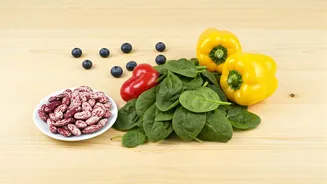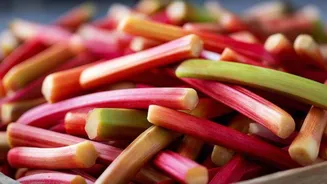Kidney Health Basics
Kidneys are indispensable organs, serving as the body's natural filtration system, removing waste products and extra fluids from the blood. They also have
an essential role in regulating blood pressure, producing red blood cells, and maintaining bone health. Since kidneys have such crucial functions, taking care of them is a primary health concern. Dietary choices are a potent means of influencing kidney health, with some foods supporting their function and others potentially causing harm. Prioritizing a kidney-friendly diet can significantly reduce the risk of kidney disease and maintain overall well-being. Understanding this relationship empowers you to make informed food choices that support and safeguard your kidney health.
Embrace Blueberries
Blueberries, frequently hailed as a superfood, offer a treasure trove of health benefits, including a positive impact on kidney health. Packed with antioxidants like anthocyanins, blueberries combat oxidative stress and inflammation, two key contributors to kidney damage. They also contain compounds that may help protect against kidney disease progression. Moreover, blueberries are a low-potassium food option, which is important because kidneys in people with kidney problems may not be able to effectively remove potassium from the body. You can enjoy blueberries in various ways: add them to your morning cereal, blend them into smoothies, or eat them as a refreshing snack. By incorporating blueberries into your diet, you are giving your kidneys a natural boost.
Fatty Fish Benefit
Fatty fish, such as salmon, mackerel, and trout, are rich in omega-3 fatty acids, crucial for overall health and specifically beneficial for kidneys. Omega-3s possess potent anti-inflammatory properties, reducing inflammation throughout the body, including the kidneys. This reduction in inflammation can help slow down the progression of kidney disease. Furthermore, fatty fish are a great source of high-quality protein, which is essential for maintaining muscle mass. However, portion control is important as excessive protein intake may put a strain on the kidneys. Regularly including fatty fish in your diet can support kidney function, helping to keep it operating at peak levels. Bake, grill, or pan-fry these fish for optimal flavor and nutritional benefits, making them a delicious and healthy choice.
Red Bell Peppers
Red bell peppers are another food that can be very beneficial for kidney health. They are abundant in vitamins A, C, and B6, along with antioxidants, but they are also relatively low in potassium. This is crucial as managing potassium intake is often a key concern for individuals with kidney issues. The antioxidants in red bell peppers work to protect kidney cells from damage, helping prevent disease. Incorporating red bell peppers into your meals is easy; they can be enjoyed raw in salads, roasted with other vegetables, or used to add flavor to stir-fries and omelets. By choosing red bell peppers, you are providing your kidneys with essential nutrients while minimizing the intake of harmful substances.
Olive Oil Advantage
Olive oil is a healthy fat option that plays a significant role in supporting kidney health. Rich in oleic acid and antioxidants, olive oil helps to reduce inflammation and oxidative stress, which are major factors that can lead to kidney disease. Using olive oil in place of other fats, like butter or processed oils, can have major benefits for your kidneys and overall health. When cooking, olive oil maintains its nutritional properties when heated. Drizzle it over salads, use it for sautéing vegetables, or as a base for marinades. Choosing olive oil is a simple yet powerful step in supporting kidney function, contributing to long-term health and well-being. Opting for extra virgin olive oil offers the most benefits due to its high antioxidant content.
Limit Sodium Intake
Excessive sodium intake poses a significant threat to kidney health, and limiting sodium is crucial. High sodium levels can increase blood pressure, which, in turn, damages the kidneys over time. Processed foods, fast foods, and many packaged snacks are often high in sodium, so being aware of these items is important. The daily recommended sodium intake is typically less than 2,300 milligrams. Read food labels carefully and choose low-sodium options whenever possible. Cooking at home allows you to control the amount of sodium in your meals, allowing you to use herbs and spices to add flavor. Making these adjustments can significantly lower your risk of kidney damage and improve overall health.
Processed Food Concerns
Processed foods are often packed with sodium, phosphorus, and other additives that can harm kidney health. Phosphates, commonly added to processed foods, can accumulate in the blood and damage the kidneys. Regularly consuming processed foods can place undue stress on these organs, exacerbating existing kidney problems. Read food labels carefully and be mindful of ingredients like phosphates and sodium. Choose whole, unprocessed foods like fresh fruits, vegetables, and lean proteins whenever possible. Preparing meals at home provides better control over ingredients. Reducing the consumption of processed foods is a proactive step toward protecting your kidneys and supporting overall health.
Reduce Red Meat
Excessive consumption of red meat can put a strain on the kidneys. Red meat is high in protein, and when the body breaks down protein, it produces waste products that the kidneys must filter. Excessive protein intake can cause the kidneys to work harder, and over time, it can accelerate kidney damage. Opt for leaner protein sources such as fish, poultry, beans, and lentils. If you do consume red meat, do so in moderation and consider choosing leaner cuts. Limiting red meat consumption and diversifying your protein sources can help reduce the workload on your kidneys, supporting their function and longevity.
Hydration Matters
Maintaining proper hydration is a fundamental aspect of kidney health and, therefore, a crucial element in your diet. Water helps the kidneys filter waste and toxins from the blood. When you are dehydrated, the kidneys must work harder, increasing the risk of kidney damage. Drinking an adequate amount of water throughout the day is essential, but it is important to take note of your individual needs. The amount you should drink depends on your activity level, climate, and overall health. Aim for clear urine as a sign that you are well-hydrated. In addition to drinking water, you can also get hydration from other beverages such as herbal teas and from water-rich fruits and vegetables.














